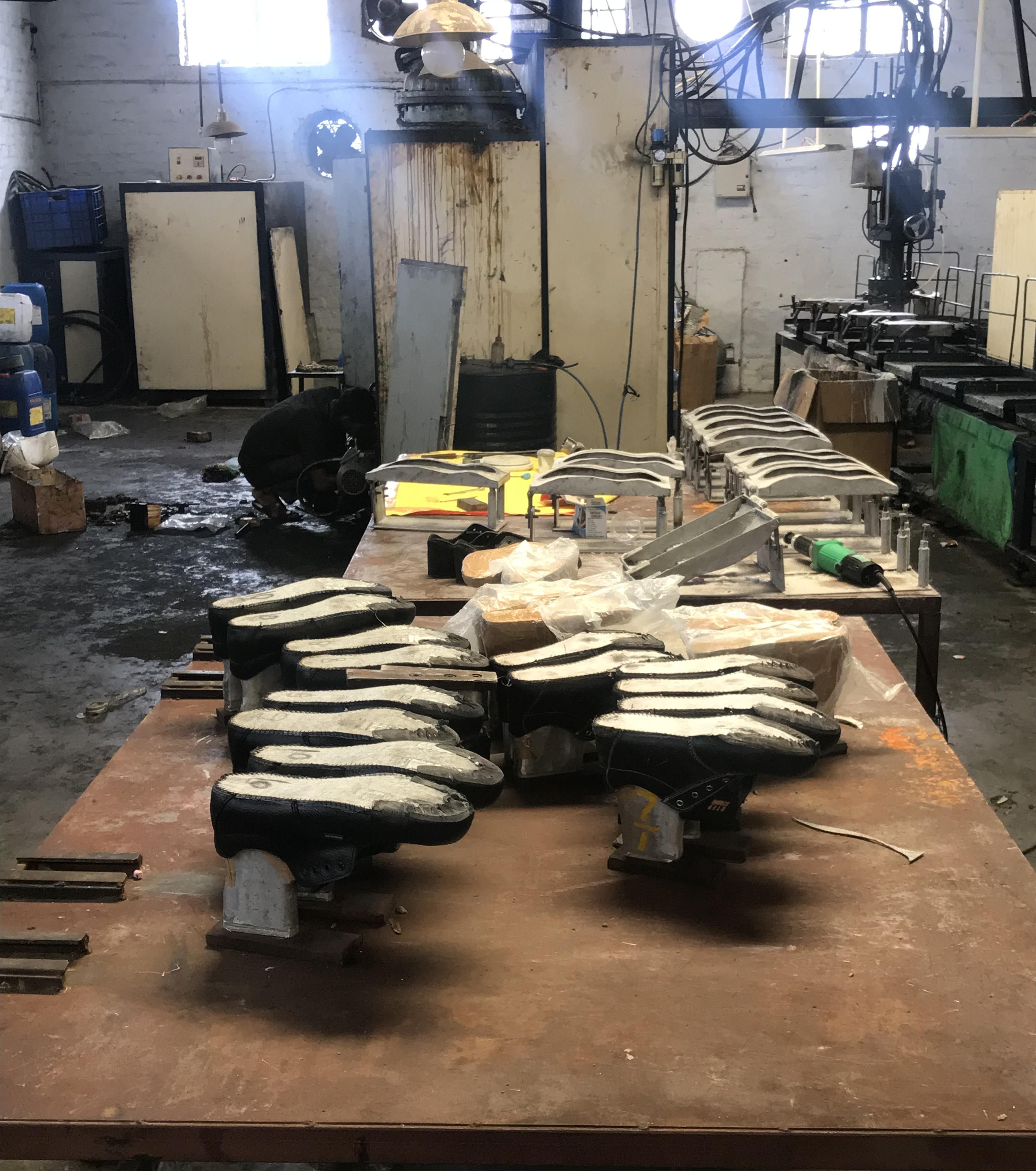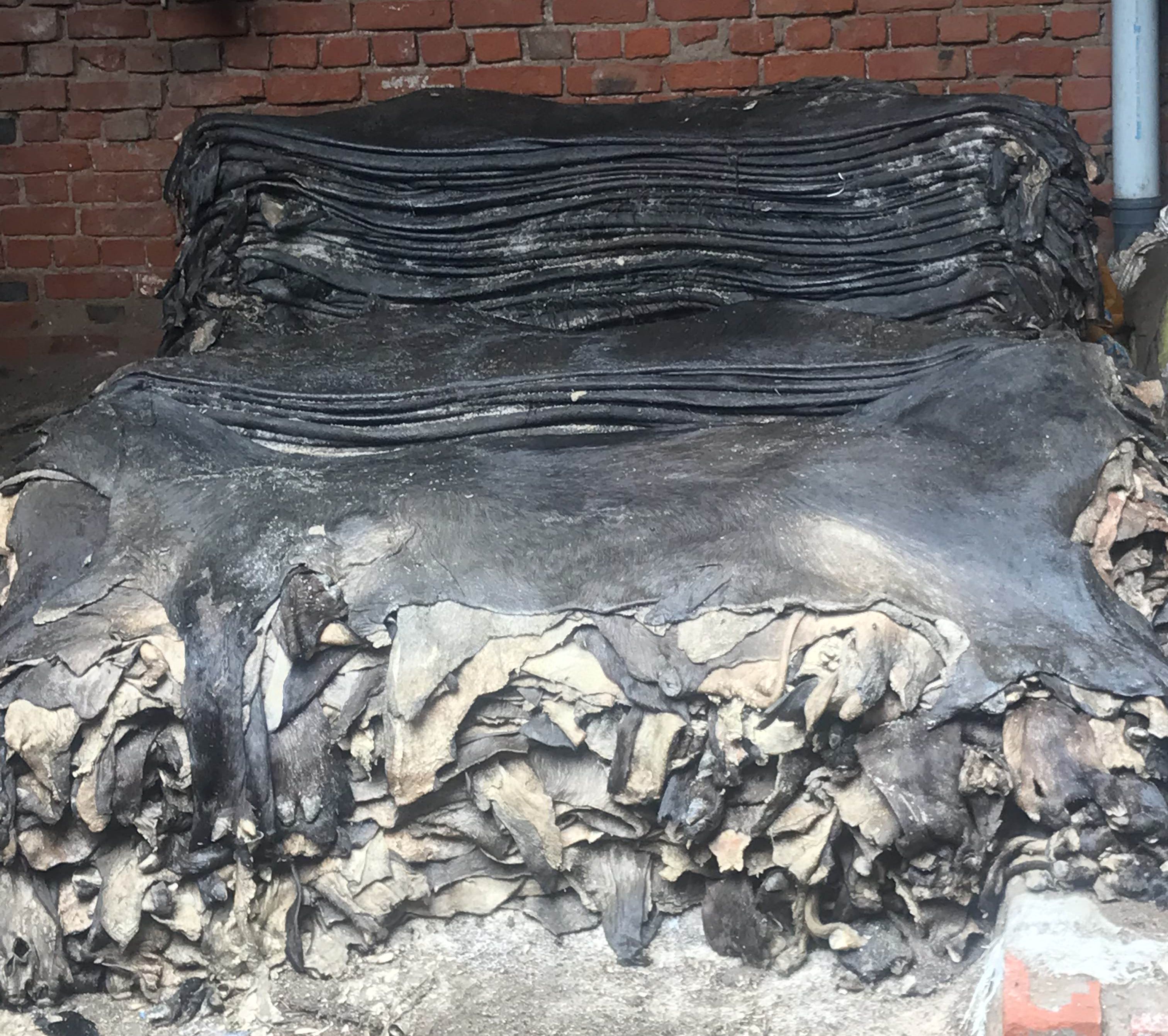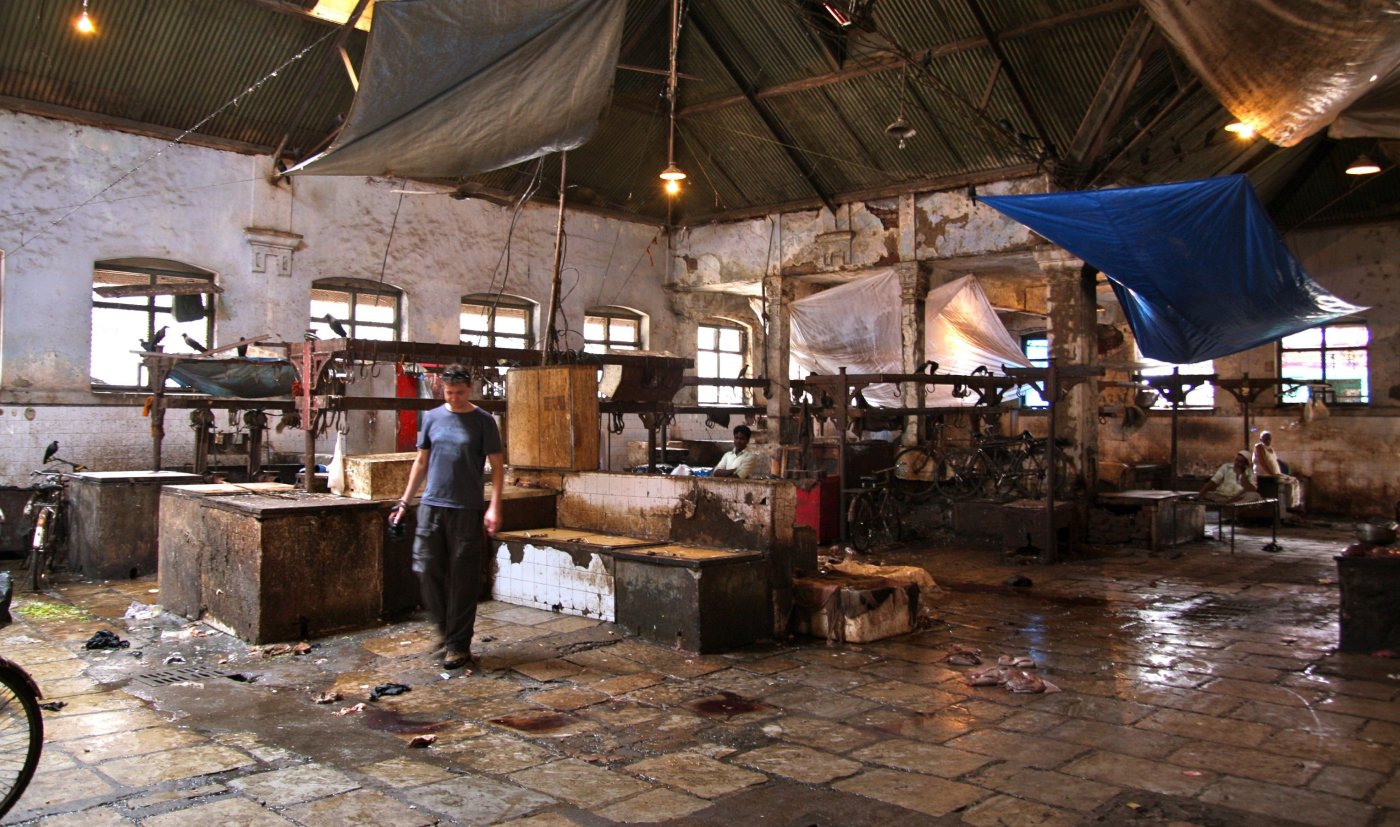Kanpur, Lucknow and Unnao, Uttar Pradesh: A (name changed on request), was once a link between the bustling tanneries of the western Uttar Pradesh (UP) city of Kanpur and major shoe manufacturers, such as Bata and Red Tape, sending them up to 500 cleaned, salted and treated animal hides in every truckload.
Swarthy and diminutive, A, a fourth-generation arhatiya was one of 500 middlemen based in Kanpur’s once-booming Pech Bagh market, full of warehouses storing and selling hides for over 120 years. The warehouses are still there, except they are used now to sell wholesale garments. As for the arhatiyas, there are no more than 50, he said.
A said he would earn Rs 1 lakh to Rs 2 lakh per order till about a decade ago, when the first challenges came in the form of large, company owned slaughterhouses. Then, he said, came the blow that felled 90% of the arhatiyas, a tightening of the laws against cow slaughter, after a Bharatiya Janata Party (BJP) led by chief minister Yogi Adityanath—who also ordered the the closure of hundreds of unlicensed slaughterhouses—came to power in 2017.
Where once a good quality hide could fetch up to Rs 1,500, today it gets him less than Rs 700-800. “So, our job as arhatiyas is finished, since the tanneries buy directly from large, private slaughterhouses,” said A.
Currently, a significant chunk of activities previously carried out by cattle-traders, arhatiyas, labourers — involved in obtaining, transporting and salting raw hides – have gone over to large corporate slaughterhouses that do the salting and tanning and sell the hide directly to leather manufacturers.
A is still one of the last few arhatiyas left but will continue, he said, until his sons complete their engineering and managerial studies. Once they do, he will bid farewell to his ancestral profession.
With the election (and re-election in 2022) of a Hindu nationalist BJP government in UP, India’s most-populous state, there have been several means of de facto (lynchings, extrajudicial encounters, arbitrary demolitions of property, curbing of dissent) and de jure marginalisation (laws against alleged forced conversions, “anti-gangster legislation” against alleged cattle smugglers, laws banning the sale and slaughter of cattle, imposition of the national security act against alleged cattle smuggers) of the state’s Muslims.
Working-class Muslim communities have faced the brunt of violence and State and non-State hostility, through overt communal action or discrimination. Overt acts of violence and hate-crimes have been widely documented, as have the decline of predominantly Muslim-owned businesses and those providing employment to Muslim workers statewide, such as brassware, Banarasi silks, and the meat trade.
The first part of this series explained how majoritarian government policies have affected lives and livelihoods in the meat trade of UP and Maharashtra. The second part investigates a similar effect and decline in UP’s leather industry, predominantly Muslim-owned, in the regions of Kanpur and Unnao. Both are based on a study that we conducted over six months between 2021 to 2022.
Once popular as the ‘Manchester of the East’ and India’s ‘Leather City’, the region, especially the Muslim-majority Kanpur cantonment assembly constituency, once abounded with tanneries and businesses dealing with finished leather goods.
Kanpur’s Jajmau neighbourhood was home to over 400 tanneries until 2018, after which more than half were shut down. A combination of factors related to environmental pollution, policies of the union and state governments, both run by the BJP, and cow-slaughter laws have sent the industry into decline.
Muslims Singled Out As Polluters
Leather exports from the country’s central region (including the Kanpur-Unnao belt) declined 8% over seven years, between 2015 and 2022, according to the latest available data from the Council for Leather Exports (CLE).
O P Pandey, an executive member of the CLE said exports fell from Rs 7,200 crore in 2014-15 to Rs 4,900 crores over five years to 2020.
Although the problem of industrial pollution via effluent discharges had long plagued Kanpur and Unnao, the campaign against pollution gathered judicial steam from 2014. That was the year that Narendra Modi became Prime Minister, and the Supreme Court decided to refer the MC Mehta cases—as litigation connected to pollution in the Ganga river was collectively known—to the National Green Tribunal (NGT).
In June 2014, the Modi government also announced the Namami Gange, literally, ‘Bowing to the Ganges’, project under the Rs 20,000-crore National Mission for Clean Ganga to clean the holy river within five years.
The Mission identified pollution “hotspots” and declared the “effective abatement of pollution, conservation and rejuvenation of National River Ganga” as its objectives. Kanpur’s leather industries were identified as a key “hotspot”.
Even though the Mission reported that pollution from the region’s industries (paper, sugar, distilleries and tanneries) constituted about 20% of the total pollution load on the Ganga, it was the leather industry and tanneries that faced the most scrutiny. Aside from the region’s industrial waste, the remaining 80% came from sewage wastewater, solid wastes and what are called “non-point source pollutants”, such as agricultural run-off, open defecation, refuse and partially cremated bodies.
“The government authorities have repeatedly accused the tanneries and industry of pollution”, said A, the middleman quoted previously. “The chemicals industry, for example, also pollutes, but nobody targets them as much. Is it because this industry (the tanneries) is dominated by Muslims?”
Industry veteran Nayyer Jamal, formerly general secretary of the Small Tanners Association, presently runs the small-scale Makhdoom tannery, which he inherited from his father in 1980. He said the occupation was no longer seen as “dignified” because of the debate around pollution and the leather industry’s decline.
Jamal argued that the stereotype of “pollution” had become an “excuse for money extraction” by government actors. He said he was able to stop, “through negotiations with the government”, a state pollution board proposal to move tanneries out of the Jajmau hub.
Yet, the decline continues, said Jamal, with 158 tanneries now from at least 400 in the early 2000s. In March 2021, 94 tanneries were closed “for violating pollution norms”.

Setting Back Muslim Livelihoods
A closer analysis of executive and judicial decisions related to “pollution control” revealed how they affected and sent the industry into decline. After the issue of industrial pollution was referred to the NGT in 2014, the tribunal passed a series of orders effectively shutting down the tanneries of Kanpur and Unnao.
In 2015, the NGT observed that around 700 tanneries in Kanpur were responsible for industrial pollution, after which the UP Pollution Control Board began closing 98 factories around the Kanpur area.
After Adityanath assumed office, his government informed the NGT that Kanpur’s 400 tanneries could be relocated elsewhere, something that the previous Samajwadi Party government of Akhilesh Yadav said could not be done because of a “paucity of land”.
A clearer, government-led crackdown was evident after 2018, in advance of the Ardh Kumbh mela, a Hindu religious pilgrimage that is held once in six years. The Adityanath government ordered tanneries shut from mid-December 2018 to 15 March 2019, citing pollution of the Ganga (considered central to the Kumbh).
Once the festival was over, the government did not issue reopening orders, even though several months passed, crippling the tanneries further. The tanneries finally reopened on 20 December 2019.
Muslim businessmen in the leather trade told us they believed such obfuscation appeared deliberate.
K, the owner of a family-owned tannery, speaking on condition of anonymity, told Article 14 that despite “having a bungalow in one of Kanpur’s most elite areas of Swaroop Nagar and living as neighbours with affluent Hindus”— along with owning a factory, a car— “[still] we are suffering”.
K identified the Adityanath government’s policies after 2018 as a key reason for their “ruin”.
“After Modi’s arrival, for the first one or two years their government took time to change policies,” said K. “But after 2017 (when Adityanath came to power) we have been hit extremely badly.”
“After 2018, they shut down all the tanneries, citing the Kumbh,” said K. “We kept waiting for the industry to open thereafter; months passed, Eid passed, Diwali also finished, Christmas also finished, and they still didn’t encourage us to resume work.”
In May 2019 (the same time as India’s general elections), the NGT ordered the closure of 78 more tanneries in Kanpur and Unnao districts, this after 260 tanneries had been shut. In November that year, the NGT imposed a Rs- 280-crore fine on 22 Kanpur tanneries, accusing them of dumping chromium, a toxic heavy metal, into the Ganga.
Even after an economic collapse owing to two deadly waves of Covid-19 nationwide, after March 2021 the UP Pollution Control Board closed another 94 tanneries in Kanpur’s Jajmau industrial area, following NGT’s orders on the same set of tanneries we referred to earlier.
In August 2021, when we visited, the tanneries said they would again be closed owing to the Magh mela and the slew of public and religious holidays that we talked about earlier. There has been no respite since. The Magh mela is held every year, usually in January till the middle of February. The tanneries were ordered shut intermittently between 3 January until 17 February 2023.
Such intermittent shutdowns, tannery owners told us, effectively meant a complete shutdown because equipment and machinery cannot be started up every three or four days.
Until a decade ago, the Pech Bagh street in Kanpur’s old city was bustling with intermediate industries related to the tannery trade, including godowns that skinned hides, stored and salted them.
When Kanpur’s government-sanctioned Bakar Mandi slaughter-house, closed in March 2017 because of orders passed by the then newly elected Adityanath government to shut “illegal” and “polluting” slaughterhouses, tanners have increasingly depended on corporate, privately-owned large slaughterhouses.
Traders no longer get hides directly from butchers, so hundreds are out of work. This is what may have happened if the controversial farm laws (later revoked) proposed by the union government were passed, meant as they were to privatise agriculture and remove middlemen and agents.
Profits that once went to middlemen in the tannery trade are now concentrated in the hands of select companies, said tannery industry representatives.
Income Of Workers, Other Intermediaries Declines
The model has not just hurt the intermediaries, but hundreds of workers, particularly from traditionally disadvantaged castes employed in the tanneries, such as Rizwan Ali.
A labourer in Pech Bagh lifting, salting, and sorting raw leather hides, Ali has been doing this work for 20 years but has never felt his economic situation become as precarious as it has after 2014.
“Tabse bahut farq hai. Na daam hai, na kaam hai. (There has been a great change since then. There’s neither fair pay, nor enough work),” he said.
Ali said he earned Rs 10,000-12,000 every month before the crackdown on the tanneries, enough for food and shelter. That’s now down to Rs 7,000-8,000. He blamed both the government’s policies and the lingering impact of Covid-19.
“But if this government goes, maybe things might change”, said Ali.
Recent years have also marked a deterioration of labour power and workers’ rights. Gibreel Kureshi is a daily wage labourer involved in footwear quality control at a company called Star Tannery in Kanpur’s Jajmau industrial area. Like Ali, he said in the two decades that he has worked in the industry he had not witnessed the decline that he had after 2014.
Half the workers with him had been fired or removed since Covid-19, he said. Before the downturn, Kureshi said he earned “Rs 300 to 350 per day, sometimes Rs 400. Today, the best he can do is Rs 275 in a day.
MR, employed in maintaining the factory of at Rahman Tanneries—one of the biggest names in the Kanpur leather industry— also spoke about the decline of unions, as privatisation eliminated their organising power. His work is based primarily in Unnao’s industrial cluster, and he travels to and fro from work via a shared tempo, from Kanpur city to Unnao every day.
Stressing on the impact of privatisation, MR said that ever since the Adityanath government’s rigidly enforced cow-slaughter laws and closure of unlicensed slaughterhouses, most of the slaughtering has now shifted to the Banthar area in Unnao, “where this work is mainly undertaken by the private players like Allana group their large factories”, noting that bigger companies offer lesser space for workers to relay their concerns.
Former Member of Parliament from Kanpur and Communist Party of India (Marxist) leader Subhashini Ali said the workers—both Hindu and Muslim—at the bottom of the rung (such as Rizwan Ali, involved in lifting and salting raw hides) were hit the hardest. “The issue is not only about the loss of the livelihoods of Muslims, it is also about various others associated with this industry, especially marginalised castes,” said Subhashini Ali. “The Dalit and most backward castes who used to pick up hides, deal with raw materials, salting the hides and similarly in the meat trades, those who did the slaughtering, the transport and supply of meat—it is these castes who have been most affected. This includes Hindus as well.”

Muslim Businesses Quietly Move Out
As a city, Kanpur’s leather industry has seen Muslims acquire socio-economic mobility during the heyday of the business. For instance, the popular SuperHouse group of tanners, led by Mukhtarul Amin and his group, have also founded English-medium schools under the “Allenhouse” name. The Mirza family is another prominent industrialist family, which owns Red Tape shoes. The city’s prominent Z-Square mall was built by the Zulfiqar Husain ZAZ group, who began as tanners. But Muslims with wealth whom we interviewed, expressed despair at their now-declining economic prospects in Adityanath’s UP.
Many said they had or were contemplating moving businesses out to West Bengal, where the Trinamool party government of chief minister Mamata Banerjee was offering cheap land, Bihar and even neighbouring countries, such as Bangladesh (where cattle are available without restrictions) and Indonesia. On 18 July 2023, the Hindustan Times reported that at least 100 tanners have taken to Bantala in West Bengal, where the government is offering plots at Rs 2, 865 per sq m to UP’s tanners.
A senior executive member of the Council for Leather Exports also expressed concern over the decline of Kanpur. “The trust of foreign buyers has been lost from Kanpur,” he said, speaking on condition of anonymity. “Now, Bangladesh and Pakistan are the biggest beneficiaries ... Superhouse Tannery, Rahman Industries are among the big players, who have set up bases abroad… 30-40 others have left for Bengal in recent times.”
Speaking on condition of anonymity, the Muslim founder and owner of a prominent multinational leather goods business based in Kanpur-Unnao, expressed his concern at the state government’s policies of the nearly three-month shutdown months (which effectively became almost 13 months), starting from mid-December 2018, during the Kumbh and Magh melas.
He said that while the Samajwadi Party and Bahujan Samaj Party governments, parties who ran the state before the BJP, also ordered tanneries shut during Kumbh and Magh melas, “it was never strictly implemented the way Yogi has ensured the closures”.
Global clients, he said, during this period sought suppliers in Pakistan, Bangladesh, China and Vietnam”. The decline of the tanneries had disproportionately impacted Muslims over Hindus, he said.
“We (Muslims) have become craftsmen now instead of business owners,” he said. Yet, those most affected appeared to be hundreds if not thousands of workers at various levels and niches in the tannery industry.
Some alleged that dominant-caste Hindu-owned tannery businesses had flourished, but that was not borne out by our statistical analysis of the directors of the top 35 meat-exporting houses of India, the data collected from company websites.
About 20% of directors in these companies are Hindu. There was no significant change in the religion of directors appointed after 2017, the year when Adityanath became chief minister: roughly three-fourths (76.09%) are Muslim. Whether this changes in the years to come, remains to be seen.
This is the second of a two-part series. You can read the first part here.
(Sharik Laliwala is a researcher and doctoral student in political science at the University of California, Berkeley. Sabah Gurmat is an independent journalist and legal researcher based in New Delhi. Prannv Dhawan is a legal researcher based in New Delhi. The research was supported by the Henry Luce Foundation in collaboration with a research project on Muslims in India, led by Sciences Po, Columbia University and Princeton University.)
Get exclusive access to new databases, expert analyses, weekly newsletters, book excerpts and new ideas on democracy, law and society in India. Subscribe to Article 14.

